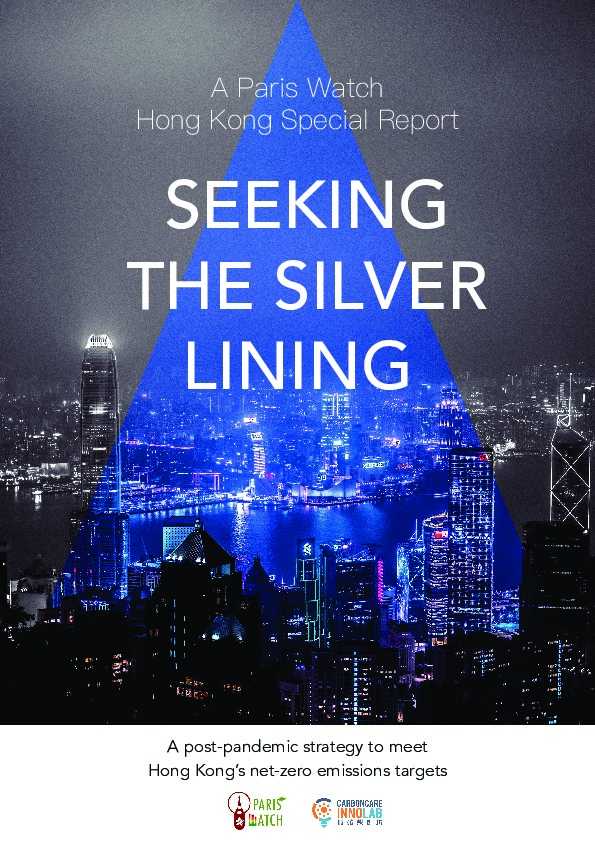The COVID-19 pandemic had a profound impact on societies around the world, and Hong Kong is no exception. Following the fifth wave outbreak and the related social distancing measures in the first quarter of 2022, Hong Kong’s economy shrank by 4 per cent. With the easing of the pandemic and the related economic incentives promoted by the Hong Kong SAR government, we can expect GDP will strongly rebound like what happened in 2021. Greenhouse gas emissions in the first half of 2020 also fell, but in the second half of the year and in 2021 they rebounded and roughly returned to the pre-pandemic levels. The global climate crisis has not been eased by the pandemic.
The 2021 Chief Executive’s policy address pointed out that "in the next 15 to 20 years, the government will invest about 240 billion HK dollars to mitigate and adapt to climate change." It is only about 2% of the annual budget expenditure, which is obviously far from sufficient. The International Energy Agency has warned that global greenhouse gas emissions will reach a new peak in 2023 as countries continue to invest in fossil fuels and fail to deliver on their investments in renewable energy. We have to question whether such incentives as proposed in the policy address are a green recovery, or just a conventional economic recovery?

A green recovery should neither be a conventional economic recovery nor a fragmented approach
Hong Kong SAR, as one of the founding members of the C40 Cities Climate Leadership Group, participated in the formulation of the C40 Mayors' Statement for a Green and Just Recovery, the first principle of which is that the only stimulus should be a green stimulus. However, the policy address focuses on the development of large-scale infrastructure projects such as the Northern Metropolis and the Lantau Tomorrow Vision projects. Carbon neutrality is obviously at a lower priority, as the government’s policy still prioritizes development over conservation. Cross-departmental collaboration and response are lacking and there are concerns regarding whether the government’s climate action plan and the policies of economic recovery are aligned with the principle of a green and just transition.
Under the premise of the carbon neutrality target of 2050, CLP and HK Electric, as the major source of greenhouse gas emissions in Hong Kong, have made commitments to net zero targets. What is expected is for the two companies and other energy companies to formulate plans to phase out coal-fired power generation and plan an early introduction of renewable energy to achieve net zero.
Second, transportation shares 18% of greenhouse gas emissions in Hong Kong. From the "Roadmap for the Popularization of ElectriVehicles in Hong Kong" announced earlier in 2021, the government is moving in the right direction in launching zero-emission vehicles. In terms of transportation planning, the establishment of more pedestrian-only zones and the collection of vehicle fees in high-traffic areas will help reduce the desire to use cars and reduce greenhouse gas emissions.
Buildings account for 90% of Hong Kong's annual electricity consumption and 60% of greenhouse gas emissions. Therefore, net zero building design is of great importance to Hong Kong's greenhouse gas emissions. Under the pandemic, many people have switched to working from home, or a hybrid work mode between office and home. The reduction of office space is inevitable. Flexible use of office space can reduce energy consumption and help reduce greenhouse gas emissions. The policy address has set building energy efficiency goals, which is an important step in reducing greenhouse gas emissions. There is also plenty of room for enhancing building energy efficiency by improving the goals.
Under the carbon neutrality goal, there is much room for energy conservation and carbon reduction
The Electrical and Mechanical Services Department has formulated a building energy efficiency code and an energy audit code, and individual building developers and owners can participate in the "Building Environmental Assessment Method" (BEAM) scheme set up by professional organizations. Yet, both of these approaches are voluntary. Some Asian cities, such as Seoul and Tokyo, are offering more incentives to encourage zero-energy or green buildings, or even mandatory installation of renewable energy, which Hong Kong could learn from. The installation of energy-efficient air conditioning and district cooling systems and smart energy systems will also help.
The pandemic also has a wide range of impacts in our society, and it is also time to promote a green recovery in all walks of life. Without outbound tourists, the transformation of the tourism industry is already taking place. Promoting the recovery of tourism can no longer rely on the complete opening of borders. Developing eco-tourism, expanding green open space and biodiversity conservation, and reducing extravagant and wasteful consumption patterns are all directions that can be explored and practiced. We are also concerned about whether "eco-tourism" can truly balance the needs of ecological conservation and tourism, rather than building tourism infrastructure in ecologically sensitive areas, attracting tourists without restraint, and generating a large carbon footprint.
The aviation industry is facing an unprecedented business restructuring, and the demand for air travel is significantly lower than before the pandemic. The government can take the opportunity to introduce a progressive air travel tax to ensure that passengers who do not fly frequently can cope with the increased cost of air travel or attend overseas family gatherings, but at the same time reduce the desire of frequent business travellers to travel, thereby encouraging them to continue to meet online. The constant expansion of the airport also appears unnecessary.
In contrast, the finance sector is ushering in new opportunities. In addition to the green bonds that the government has launched, a financial platform should be established to coordinate a wide range of stakeholders, to generate hybrid public-private financing for green infrastructure projects. In addition, Hong Kong is definitely in a position to undertake more emissions trading tasks following the Guangzhou Emission Trading Centre. The funds obtained from carbon trading can subsidize local transportation and energy expenses, reducing the pressure on price increases, and the surplus can be used to make up for various pandemic subsidy expenses and to cope with the rising social welfare expenses after the pandemic.
The key to green recovery is to break away from tradition
The pandemic and extreme weather have also brought new challenges to community service, but there are also opportunities for transformation. With the dual threats faced by the vulnerable groups, the original community service has found it difficult to cope with, but there must be a re-learning to improve their disaster prevention and response capabilities. And service providers are also in the best position to collect and provide data so that relevant researchers and policymakers can formulate more efficient climate adaptation policies.
Finally, we should not forget the important role of the government in facilitating the above measures, so the post-pandemic green recovery must be top on the Chief Executive's agenda. The Chief Executive is chairing the Steering Committee on Climate Change and Carbon Neutrality, and the Environment Bureau will set up a new Office of Climate Change and Carbon Neutrality, and will set up a dedicated advisory committee. We expect these three bodies can effectively promote the implementation of climate mitigation and adaptation measures, especially assessing disaster risks, strengthening governance, and investing in risk reduction and preventive recovery measures. We hope that the economic recovery measures proposed in the government's policy address will no longer be conventional economic recovery, but a real green recovery. The guiding principle of just transition should also be implemented in every policy of the government.
(This article is an extract from the CarbonCare InnoLab's Paris Watch Hong Kong Special Report, "Seeking the Silver Lining".)
About the author:
Kevin Li is a Researcher at CarbonCare InnoLab, a Hong Kong-based environmental NGO. He leads research that tracks the annual performance of Asian cities against the Paris Agreement goals. He has 25 years' work experience with international NGO, covering the issues of climate change, sustainable development and poverty reduction.



